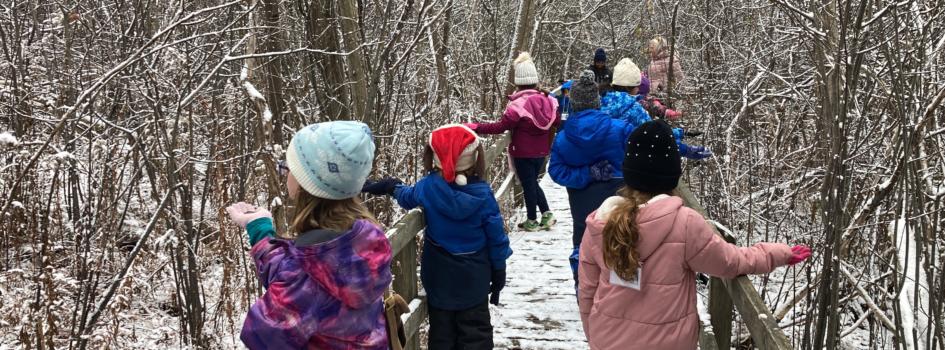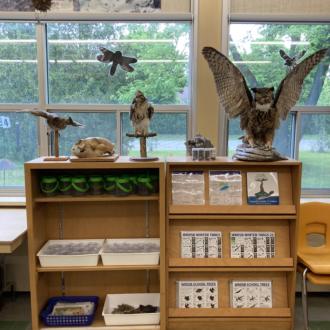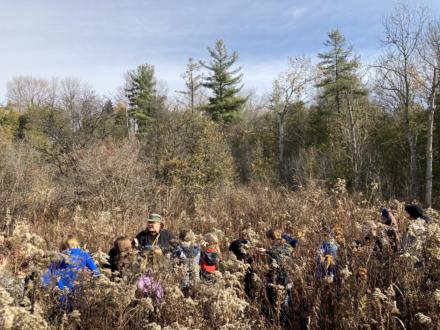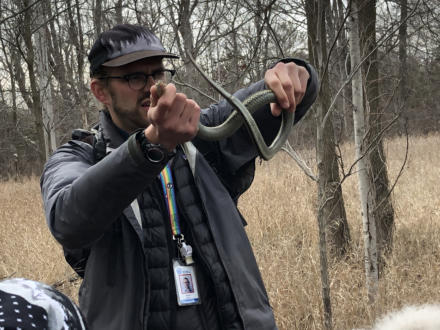
Information for Teachers: Blair Outdoor Education Centre Field Trips
For the most current program descriptions see: OEE Program Descriptions 2024-25
The following information can be found in this page:
- Family Letter and Forms
- Transportation Procedures
- Location
- Volunteers
- Preparing for the Excursion
- Cancellation due to Bad Weather
- Wheelchair Accessible Transportation
- All Terrain Wheelchair
1. Family Letter and Forms
Please be certain to use this Family Letter on school day as it informs parents about the potential risks, conditions, and what kids should bring with them:
OEE Field Trip Family Letter 2024-25
You will have to manually update your copy of the letter with information specific to your class and trip date.
Complete IS-04-F-1 form and send it to parents. Your Principal will also need a copy of this form.
Parent permission form IS-10-F-2 Field Trip Form. (Parent Student Information and Consent for on-going off Campus Activities). You can send printed permission forms home, use school day and/or use a google form to collect parent permissions.
2. Transportation Procedures
School staff are responsible for booking the school bus. Please check with the office if you are unsure of bus booking procedures at your school. Payment will be made for your school by Learning Support Services.
There is no cost to schools for OEE Centre visits. Busing costs for WRDSB Outdoor Education programs are covered by Learning Support Services.
Teachers are required to complete the Off Campus Category 1 form (IS-11-FA) with Principal permission, including the bus confirmation number, and submit to finance-off-campus@wrdsb.ca. School staff are responsible for booking their own buses and recording the appropriate information on the Off-Campus Excursion Category I form (IS-11-FA). On the budget code line of the off campus form school staff should indicate “To Be Covered By LSS”.
Please book school buses as early as possible given that bus availability can be limited.
The phone numbers for bus companies operating in Waterloo Region are listed below. More information can be found at https://www.stswr.ca/operators/
- Elliott Coach Lines (Breslau Division) 519-648-9548
- Voyago Transportation Services 519-593-1008
- Sharp Bus Lines 519-896-2822
- Country Mile Bus Lines 519-669-5557 (limited capacity of 24 passengers)
Trip times for full day programs at Blair are as follows:
-
Depart school: 9:30AM
-
Depart nature centre: 1:30PM
3. Location
Blair Outdoor Education Centre 82 Meadowcreek Lane Cambridge ON N2J 2A9
4. Volunteers
You may bring as many parent volunteers as you wish. Extra adults can help out in many ways. Please give volunteers as much information about the trip as possible, and outline specific responsibilities you may have for them. The WRDSB guidelines for field trips require a minimum supervisor ratio of:
- 1:8 for primary
- 1:10 for junior
- 1:15 for intermediate
- 1:20 for senior
The expectations for the use of volunteers are outlined in AP 1415:
Principals shall ensure that there is sufficient supervision and all volunteers are screened, as appropriate (“Volunteer Interview Form”)
Principals shall request appropriate references and ensure verification (“Volunteer Reference Check”)
Volunteers who are in direct contact with students in a setting that is supervised by a staff member are not required to submit a police record check.
Please note that the Outdoor Education Specialists are not factored into the ratio as they are focused on delivering the program.
5. Preparing for the Excursion
Nutrition Break
Please instruct students to bring their reusable water bottle and lunch. For Elementary classes, time will be allotted for nutrition break at the Outdoor Education Centre. Please encourage students to keep their waste to a minimum. There are waste facilities at our centres but we recommend practising a boomerang lunch.
Is there a cost for the program?
No. Costs for the program and busing will be covered centrally.
Is this program led by the WRDSB staff?
Yes, a WRDSB Outdoor and Environmental Education Specialist will be leading this program.
Are there washrooms?
There are washrooms at all of our sites. Students should be encouraged to use the washroom before getting on the bus.
Setting the stage for a positive experience
Student safety is a priority. Classroom norms that exist in the school are also in effect during outdoor learning opportunities. A positive way to begin a great learning experience is to review class norms, acceptable student choices and respectful behaviour agreements.
Materials and Equipment
Any program equipment required for the activity will be provided by the centre.
Name Tags
Teachers are encouraged to ensure that students wear name tags. This will help facilitators and volunteers engage with students.
What should students wear?
Students (also teachers and volunteers!!) must be dressed appropriately for the weather. Please ensure that this is communicated to families prior to the visit. PLEASE ensure that the students are properly dressed prior to loading on the bus. This might include warmer clothing in layers, warm hat, mitts/gloves, rain wear, rain or winter boots… or some combination of all of those. Long pants and socks/closed toed shoes are recommended for added protection from ticks during warmer weather (see below). Appropriate footwear for walking distances on uneven terrain is recommended to reduce the likelihood of slipping. The Family Letter Template (item 1 above) contains information about dressing appropriately that must be communicated to parents and caregivers.
What if students don’t have access to appropriate outdoor clothing?
Blair OEE Centre has gear to lend for students who experience barriers to accessing appropriate outdoor clothing or footwear. We can lend rain coats, winter coats, mittens, clean hats, and rubber rain boots. Please contact Nathan if you know anyone who would like to donate new or gently used clothing or outdoor gear to the gear lending program.
Ticks and Lyme Disease
Ticks are present in Waterloo Region and have been identified at some of our nature centre locations. Only Black-legged Ticks transmit Lyme disease. Waterloo Region is a low risk area for Lyme Disease. If students or parents are concerned, please advise them to wear light, long-sleeved shirts and pants that can be tucked into socks or boots. For more information please check the Waterloo Region Public Health Website.
6. Cancellation Due to Bad Weather
Trips are cancelled if schools are closed and/or buses are not running. In cases of extreme weather (heavy rain, extreme cold, high winds) we will communicate possible cancelation and/or rescheduling opportunities to you and the school administration as soon as possible, typically 24 hours in advance of the scheduled trip date. Due to high demand, there may be limited opportunity for rescheduling.
7. Wheelchair Accessible Transportation
Voyago Transportation Services typically has wheelchair-accessible buses.
8. All-Terrain Wheelchair
If an all-terrain wheelchair is required for a student in your class, please connect with your school’s centralized Special Education contact person to make the arrangements.
Students who require all terrain wheelchair access to an Outdoor Education centre should be connected with an orthopaedic itinerant teacher through an ortho referral through MDST. We do have some all terrain wheelchairs centrally available that can be accessed through the orthopaedic itinerant team. However, the AT wheelchairs vary in size and style – not all students are able to sit safely in the AT wheelchairs as they are typically less supportive than a student’s home-based wheelchair.
The school arranging the trip should connect with the ortho itinerant well ahead of time to determine if suitable accessibility equipment can be transferred out to a site for the class trip. If an ortho-itinerant referral has not been made for the student, the school would need to contact their School Liaison Consultant to get next steps.
Another consideration would be the equipment /support /space required for personal hygiene for use of facilities differs at each site. It would be important to also connect with the itinerant for your individual student’s needs.
Categories: Blair


